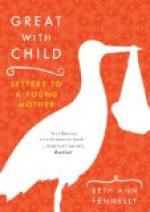Dr. Cullen, whose opinion on topics of this kind is certainly entitled to much respect, thought that less than seven, or more than eleven months of nursing was injurious. Yet in some countries, and even in some parts of our own, the period is extended by the mother, from choice, to two years. And although the milk is not so good after the thirteenth or fourteenth month, I have never either known or heard that any evil consequences followed from the practice.
Dr. Loudon, a recent writer, observes, that the period of nursing has a great influence over the numbers of mankind in various countries, as is evinced by numerous facts. He adduces proofs of this, position. Thus, he says, in China, where the population is excessive, and the inhuman practice of infanticide is common, they wean a child as soon as it can put its hand to its mouth. On the other hand, the Indians of North America do not wean their children until they are old and strong enough to run about: generally they are suckled for a period of more than two years.
He then enters into a physiological inquiry why it is that British mothers do not usually suckle their children longer than ten months. He seems—though he does not give us his precise opinion—to think that, in all ordinary cases, the period of nursing ought to be protracted to two or three years, and that perhaps it would be better still to extend it to four or five. His remarks are so excellent, and withal so curious, and their tendency so humane, that we venture to insert one or two of his paragraphs entire.
“Certain it is, that the milk does not diminish particularly at that time, (ten months,) so far as regards quantity; and from the health of children reared without spoon-meat beyond this time, it as certainly undergoes no change in its quality. Children are sometimes so old before weaning, as to be able to ask for the breast; and it has not been remarked that the health of mothers, thus suckling, was in any way worse than that of their neighbors. Altogether, then, it may be asserted, that a mother is likely to enjoy better health, and to be less liable to sickness and death during lactation, than during pregnancy.
“Many women believe, or affect to believe, that the weakness they labor under arises from some latent moral or physical cause; but this weakness is not attributed to lactation in the earlier months of suckling, because the mother then considers herself fulfilling a necessary duty, which her constitution, for so long, is well able to bear. So soon, however, as the period of lactation has passed over, as it is established by custom or fashion, she imagines she is exceeding the intentions of nature, and she forthwith concludes that the continuance of suckling is the cause of her uncomfortable sensations. This whim being entertained, the child is weaned, and too often becomes the victim of a most reprehensible delusion.




